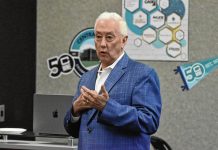Area Christians and Muslims figuratively joined hands in friendship on common ground despite their differences before about 125 people at the Columbus Area Visitors Center.
Wednesday’s crowd included leaders from local human rights, law enforcement, a community dialogue group, interfaith representatives, professors, retirement leaders and others for “Just Faith: An Open Christian and Muslim Dialogue of Peace and Common Values.”
“I don’t have to demand the exact same religious belief of someone I choose to befriend,” said the Rev. Clem Davis, longtime pastor of St. Bartholomew Catholic Church, Bartholomew County’s largest single house of worship.
He referred to believing Jesus is God, although Muslims view him as a revered prophet.
[sc:text-divider text-divider-title=”Story continues below gallery” ]
The free, two-hour event, often punctuated by good-natured bantering and humor amid even serious issues, was an outgrowth of a 14-member Christian-Muslim group — one that included Davis — that began meeting a year ago, about four months after three local Christian churches were spray-painted with graffiti of Islamic messages. Group members completed a study of common histories, faiths and values, and began a lifelong commitment to peace, organizers said.
A debate over religion has sprung up nationally, most recently when Republican presidential candidate Donald Trump suggested in early December that Muslims should be prevented from entering the United States until U.S. officials can get a better idea who has been responsible for terrorist acts.
Trump’s message was in the wake of a deadly shooting in San Bernardino, California, by suspected Islamic State sympathizers — and was issued a day after President Barack Obama urged Americans not to turn against each other.
The national political debate continued Wednesday in Washington when Senate Democrats blocked a bill that would crack down on Syrian and Iraqi refugees coming to the U.S. The Senate vote — which was 55-43 — fell short of the three-fifths needed to move ahead.
In the House of Representatives, meanwhile, legislation would require new FBI background checks and individual sign-offs from three high-ranking federal officials before any refugee from Syria or Iraq could come to the United States. It received 289 votes, a veto-proof margin that included 47 Democrats — despite Obama’s opposition.
But in Columbus, work continued to identify common ground between Christians and Muslims.
The local group includes seven Christians from various churches and seven from the 150-member Islamic Society of Columbus Indiana. For five months off and on, they shared meals with one another, attended one another’s prayer and worship services, and examined each other’s creeds and scriptures.
And something happened beyond the learning and growing.
“What I did not expect was to fall in love with these people as (spiritual) brothers and sisters,” said Jan Banister, a panel member who attends St. Bartholomew, one of the churches that was vandalized by graffiti.
That emotional message connected with people in the crowd such as Arleen Keele, who has welcomed Muslim speakers at her First United Methodist Church, and who has visited the Islamic Society’s mosque.
“They were clearly speaking from the heart,” Keele said of a series of speakers.
Some of the dialogue leaders said similar meetings may be held in the future.
Muslim Ala’a Wafa, a former Columbus resident now serving as an attorney for Cummins Inc. in Indianapolis, said she was moved to know that interfaith connections were strong enough locally that a Christian felt comfortable enough to phone her father, Marwan Wafa, a local Muslim leader and the former vice chancellor and dean of IUPUC, immediately after Muslim graffiti was found on the Christian churches in August 2014.
“That in itself shows the value of (previous) interfaith dialogue,” Ala’a Wafa said.
She became a significant voice in other segments of the meeting when she explained that no genuine follower of Islam would seek to institute the faith’s guidelines of Sharia Law in the United States, as she said some Americans may suspect or fear.
“In order to be properly practicing Muslims, we are obligated to follow the laws of this land and the U.S. Constitution,” Ala’a Wafa said. “If we tried to pass Sharia and disregard the Constitution, then we’re really violating our own faith.”
Zulkifly Yusuf, former president of the Islamic Society of Columbus Indiana, and a member of the local Christian-Muslim group from last year, said members of the interfaith group that met last year never concerned themselves with trying to convert anyone.
“It’s not me who can change people’s opinion, anyway,” Yusuf said. “It’s God.”
Some of the meeting’s participants, such as Aida Ramirez, director of the Columbus Human Rights Commission and a St. Bartholomew member of last year’s Christian-Muslim group, mentioned that despite considerable advances toward spiritual unity, some problems remain among minority groups still facing misunderstanding or derision locally. She said those groups included Muslims, blacks, Latinos and others.
“There is a substantial proportion of ethnic, religious and other minorities still choosing not to stay in this community because they don’t feel welcome,” Ramirez said.
Ala’a Wafa, who has spoken frequently about the rejection she faced in areas such as Evansville, said acceptance begins as simple as smiling and showing kindness to international residents in the grocery store. There, she said some of her Muslim friends wearing traditional head scarves sometimes are fearful in Columbus because people seem to try to avoid them in the aisles.
At home, another step can be huge, she said.
“Let your kids know that Muslims aren’t scary,” Ala’a Wafa said.
And the Rev. Scott Hill, a Presbyterian minister who served with the Christian-Muslim group, encouraged people to speak up when they hear people make extreme, and extremely suspect or inaccurate statements about Muslims.
“You can start by simply asking them, ‘What makes you say that?’” Hill said.
The Associated Press contributed to this report.
[sc:pullout-title pullout-title=”Seeing commonalities” ][sc:pullout-text-begin]
The Rev. Scott Hill, one of the members of the 14-member Christian-Muslim group that met last year, lived for years in places such as Morocco and Egypt, where the Muslim population is substantial.
At Wednesday’s “Just Faith” gathering, he quickly highlighted a few commonalities between Christianity’s Bible and and Islam’s Quran:
- Shared major figures such as Adam and Eve, Moses, Mary and Jesus — and even some of Jesus’ miracles.
- A shared list of prophets such as Elijah and Abraham.
- A variety of shared common principles, from the discipline of prayer to alms for the poor.
[sc:pullout-text-end][sc:pullout-title pullout-title=”The meaning of jihad” ][sc:pullout-text-begin]
Hannah Omar, a New York City native and local resident serving as the spokesperson for the Islamic Society of Columbus Indiana, said Wednesday that people need to know the true Muslim meaning of term jihad — a world that Islamic State groups have used to justify violence and killings.
She said the word in Arabic, the language of the Quran, Muslim’s holy book, literally means to strive or persevere toward a goal or cause.
“In our scripture, there actually is no such thing as a holy war,” Omar said.
She also said the Quran forbids killing of any innocent people, and that to do is equated with killing all of humanity. She added that even defending oneself in battle carries strict guidelines.
[sc:pullout-text-end][sc:pullout-title pullout-title=”Want to learn more?” ][sc:pullout-text-begin]
For those wanting to see more interreligious dialogue after Wednesday’s session, Interfaith Forum of Columbus has organized an interfaith gathering from 11:30 a.m. to 4 p.m. Feb. 6 at the Unitarian Universalist Congregation of Columbus, 7850 W. Goeller Boulevard.
Area representatives from at least more than a dozen faiths — Christian, Muslim, Hindu, Buddhist and others — will speak about the history of their beliefs and their interpretation the Golden Rule, according to organizers.
Information: Anita Naanes at [email protected].
[sc:pullout-text-end]




